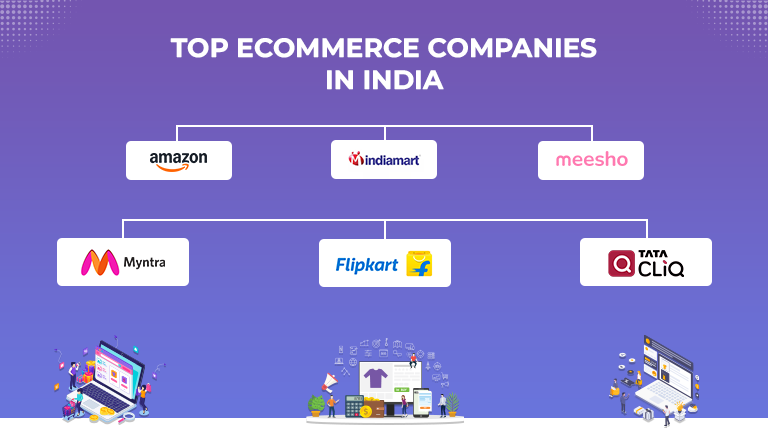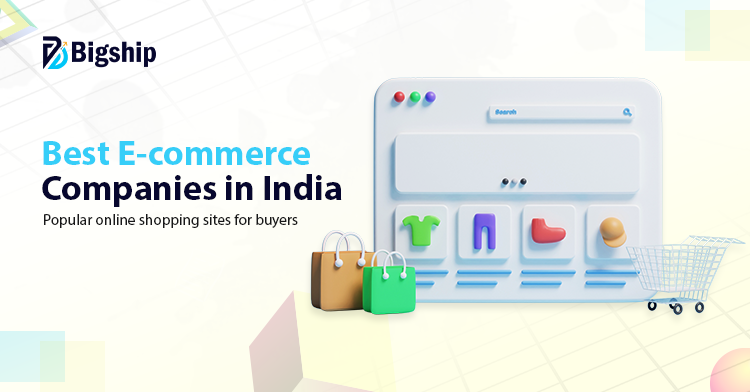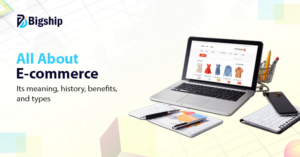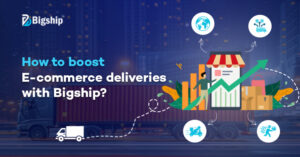Online shopping has changed how we buy things. From fashion to furniture, everything is just a click away. But with so many options, finding the best e-commerce websites can be confusing.
Each e-commerce company offers something different, some focus on discounts, while others promise quality. Whether you need groceries, gadgets, or stylish outfits, knowing where to shop makes all the difference.
This blog covers a list of India’s top e-commerce platforms which make your shopping easier and smarter. Let’s explore the best places to buy online!
What are E-commerce Platforms?
An e-commerce company is a digital space where businesses sell products and services through the internet and makes online shopping possible. These platforms manage everything, product listings, payments, and customer interactions. Whether it’s a small business selling handmade crafts or a large marketplace with thousands of brands, they all rely on e-commerce websites to connect with customers.
Different Types of E-commerce Platforms
E-commerce companies operate in different ways, depending on who they sell to. Here are the four main types of e-commerce platforms:
Business to Business (B2B): This model is about companies selling to other businesses. Think of Alibaba, Bigcommerce or Shopify, these are some of the largest e-commerce companies, where brands buy in bulk or use services to run their own stores.
Business to Consumer (B2C): This is the most common type, where businesses sell directly to customers. Amazon, and Zomato are great examples of B2C platforms.
Consumer to Business (C2B): Here, individuals offer products or services to businesses. Freelancing platforms like Fiver, Upwork, and Airbnb follow this model.
Consumer to Consumer (C2C): This is where people sell to other people through an online marketplace. Meesho and Etsy are popular e-commerce platforms where independent sellers directly connect with buyers.
Top 10 E-commerce Platforms in India
Some of the largest e-commerce companies in India are mentioned below.

Amazon India
Amazon needs no introduction. It entered India in 2013 and quickly became the go-to shopping platform. Whether you need groceries, electronics, fashion, or books, Amazon has it all. The convenience of one-day delivery and Prime membership perks keep millions of customers hooked. Amazon, with its massive network of warehouses and delivery hubs, ensures products reach every corner of India. From smartphones to daily essentials, Amazon makes online shopping easy and reliable.
Established in: 1994
Founder: Jeff Bezos
Headquarters: Seattle, Washington, USA
Flipkart
Flipkart is India’s homegrown e-commerce giant. It started in 2007 as an online bookstore and grew into a multi-category marketplace. Today, it sells everything, mobiles, fashion, appliances, and more. The Big Billion Days sale is one of the most awaited shopping festivals in India. Flipkart’s affordability-focused features like no-cost EMI and Pay Later make it a favorite.
Established in: 2007
Founders: Sachin Bansal and Binny Bansal
Headquarters: Bengaluru, India
Myntra
Myntra is where the majority of Indians shop for fashion. It started in 2007 and soon became the top online destination for clothing, footwear, and accessories. The platform brings global brands, trendy styles, and great deals. Be it’s casual wear, ethnic outfits, or sportswear, Myntra has something for everyone. Their End of Reason Sale (EORS) is hugely popular. It also owns Jabong, which added to its market share.
Established in: 2007
Founders: Mukesh Bansal, Vineet Saxena, and Ashutosh Lawania
Headquarters: Bengaluru, India
Tata CLiQ
Tata CLiQ is where quality meets trust. It was launched by the Tata Group and offers premium fashion, electronics, and home essentials. Unlike other marketplaces, Tata CLiQ focuses on authentic, branded products. The platform also introduced “phygital” shopping, that allows customers to order online and pick up from nearby stores. Whether it’s luxury brands or everyday essentials, Tata CLiQ guarantees genuine products with reliable delivery.
Established in: 2016
Founder: Tata Group
Headquarters: Mumbai, India
Meesho
Meesho is making e-commerce accessible for small businesses and resellers. It allows people to sell fashion, home decor, and more through WhatsApp, Facebook, and Instagram. Meesho was launched in 2015 and empowers micro-entrepreneurs by handling logistics and payments. It’s a game-changer for people looking to start an online business with zero investment.
Established in: 2015
Founders: Vidit Aatrey and Sanjeev Barnwal
Headquarters: Bengaluru, India
IndiaMart
IndiaMART is the backbone of B2B e-commerce in India. It connects buyers and suppliers across industries. Whether you need raw materials, machinery, or wholesale products, IndiaMART has it. It helps small businesses reach new customers without heavy investments. The platform supports industries like manufacturing, agriculture, and construction.
Established in: 1996
Founder: Dinesh Agarwal
Headquarters: Noida, India
ShopClues
ShopClues focuses on affordable shopping. It brings budget-friendly fashion, home essentials, and electronics to customers, especially in small towns. It was founded in 2011 and quickly gained popularity among price-conscious buyers. It offers “Sunday Flea Market” section for unbeatable deals. ShopClues is a platform where affordability meets variety and makes online shopping accessible to all.
Established in: 2011
Founders: Sandeep Aggarwal, Radhika Aggarwal, and Sanjay Sethi
Headquarters: Gurugram, India
Nykaa
Nykaa which was launched in 2012 has transformed beauty shopping in India. It offers makeup, skincare, and wellness products from top global and Indian brands. Nykaa’s in-house beauty products are also a big hit. The platform provides tutorials, beauty guides, and influencer collaborations. Nykaa Fashion later expanded into clothing and accessories.
Established in: 2012
Founder: Falguni Nayar
Headquarters: Mumbai, India
BookMyShow
BookMyShow is India’s favorite platform for booking movie tickets, concerts, and events. It was started in 1999 has revolutionized entertainment booking system. Be it’s Bollywood blockbusters or live stand-up shows, BookMyShow makes it easy to grab tickets. It also offer online streaming and sports event bookings. With a user-friendly app and great cashback deals, it’s the ultimate ticketing hub.
Established in: 1999
Founders: Ashish Hemrajani, Parikshit Dar, and Rajesh Balpande
Headquarters: Mumbai, India
AJIO
AJIO is a part of Reliance Industries that was launched in 2016. This online fashion hub quickly gained popularity for its trendy collections. AJIO brings a mix of high-street fashion and homegrown labels, offering ethnic wear to Western outfits. The platform is known for its affordable pricing and frequent sales. It also promotes Indian brands and unique designer collections.
Established in: 2016
Founder: Isha Ambani
Headquarters: Bangalore, India
E-Commerce in India: What’s Changing and What’s Next?
E-commerce in India is evolving at a rapid pace. With more businesses moving online and technology getting smarter, the industry is set to grow even bigger. The Indian e-commerce company landscape is projected to reach USD 325 billion by 2030, with D2C alone expected to hit USD 60 billion by FY27. Here are some major trends shaping the future of online shopping in India.
A Market Growing at Full Speed: E-commerce is no longer just about big cities. More people from small towns and villages are shopping online this will result in massive industry growth. With better internet access and digital payments, businesses are reaching customers everywhere. The expansion of online sales in Tier 2 and Tier 3 cities has played a huge role in this shift.
Shopping on Mobile: Most people today browse and shop using their smartphones. Mobile commerce or M-commerce is making online shopping faster, easier, and more interactive. From AI-powered recommendations to mobile-friendly payments, brands are ensuring a smooth shopping experience for their customers.
Social Media Selling is Booming: Scrolling through social media and buying a product within seconds is the power of social commerce. Brands are using Instagram, Facebook, and WhatsApp to connect with buyers directly. Reports suggest this market could reach USD 70 billion by 2030.
Voice and Visual Search Make Shopping Easier: Customers no longer need to type what they are looking for. Voice and visual search features allow them to find products just by speaking or uploading an image. This is especially helpful for those who want a quick and effortless shopping experience.
Direct-to-Consumer (D2C) Brands Are Thriving: The D2C model is changing how businesses sell. Brands can connect with customers directly and build long-term relationships without the concept of middlemen. This market is growing fast and is set to reach USD 60 billion by FY27. More startups and established brands are choosing this route for better control over their sales and customer experience.
Last-Mile Delivery is Getting Smarter: Fast and reliable delivery is crucial for online shopping. E-commerce companies are improving logistics by using drones, electric vehicles, and real-time tracking. The ultimate goal is to make deliveries quicker and more efficient, ensuring that every customer becomes a happy customer.
Sustainability Matters More Than Ever: Businesses are now focusing on eco-friendly packaging, reduced waste, and green energy. As the awareness about sustainability is increasing, brands are taking steps to make e-commerce more environment-friendly without compromising efficiency.
Buy Now, Pay Later (BNPL) is Growing: Customers love flexibility, and Buy Now, Pay Later services are making it easier to shop without immediate full payment. This payment model is helping buyers manage their finances while increasing sales for businesses.
Biggest Challenges for E-commerce in India
Though e-commerce in India is booming, however there are hurdles in its way. Businesses face several challenges that affect operations and growth. Here are the key issues that even the best e-commerce websites in India are facing:
Delivery and Logistics Issues: Shipping across India isn’t easy, especially with remote locations and poor infrastructure. Managing deliveries smoothly without strong logistics can be tough for brands. Even the best e-commerce platform in India needs efficient supply chains to keep their customers happy.
High Return Rates: Returns are a major concern. Many customers send back orders, leading to heavy losses for sellers. Some even refuse orders at the doorstep which increases costs for businesses.
Payment Fraud and Data Security: As online shopping is growing, so is online fraud. And this is a growing concern. Fake orders, phishing scams, and hacked accounts put businesses at risk. Secure payment systems and fraud detection tools are essential.
Cash on Delivery (COD) Risks: COD is popular, but it comes with risks. Customers change their minds at the last minute which can lead to failed deliveries. Handling cash also increases the chances of loss or fraud.
Expanding to Rural India: It becomes challenging to reach rural customers due to limited internet access, language barriers, and higher delivery costs. Many prefer COD, making it harder for businesses to operate profitably.
Legal and Compliance Challenges: E-commerce brands must follow various laws, including GST, data protection, and cyber laws. Failing to meet regulations can lead to fines and business troubles.
Conclusion
E-commerce has changed how we buy and sell, thus, making it easier for businesses and customers to connect. From big brands to small sellers, everyone has a chance to grow online. The best e-commerce platforms in India are setting new benchmarks, by making online shopping a new normal. With the right approach, selling online becomes easier and more profitable.
E-commerce will continue to open new doors for businesses of all sizes. Apart from that with courier partners like Bigship, you get seamless shipping, affordable rates, and top-notch services to make your e-commerce business a hit.
Sign Up with Bigship and scale up your e-commerce business effortlessly and thrive in the digital marketplace.
FAQs
What are the major business models in Indian e-commerce?
The main models include B2B (Business-to-Business), B2C (Business-to-Consumer), C2C (Consumer-to-Consumer), and D2C (Direct-to-Consumer).
What is the biggest challenge for e-commerce companies in India?
The biggest challenge for e-commerce companies in India is managing logistics and deliveries, especially in remote areas with poor infrastructure.
How do top e-commerce websites in India manage shipping and delivery?
Top e-commerce websites use reliable shipping partners, like Bigship, or dropshipping to deliver orders. Many brands are also using shipping tools to manage more orders efficiently.
What are shipping aggregators, and how do they help e-commerce businesses?
E-commerce companies use courier aggregators like Bigship to handle many orders. These aggregators work with multiple delivery partners to make shipping easier. They help businesses get better rates, flexible options, and extra services.





